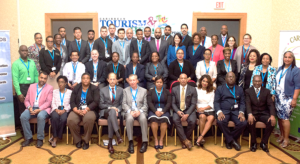No one enjoys getting sick, especially when you’re far from home. Travel-related illness can turn a vacation or a work trip into a nightmare especially if you are alone. Contagious germs and “travel bugs” are everywhere when you travel and even though we may wipe our airplane tray tables with a disinfecting wipe, sanitize our hands before every meal or stick to well-cooked meals, many of us still get sick. The Centers for Disease Control and Prevention estimates that travelers’ diarrhea (TD) is the most predictable travel-related illness. Attack rates range from 30% to 70% of all travelers[1] and in the Caribbean for the period 2010-2016, over 250 outbreaks of gastroenteritis (GI) were reported to Caribbean Public Health Agency (CARPHA), one third of which were travel-related. Norovirus is now the most frequent cause of GI outbreaks in local and visitor populations. From 2005 to 2018, cases increased by 41%, primarily due to travel related outbreaks. One outbreak in 2012 caused 1,256 illnesses, closure, travel advisories and a 30% decline in arrivals for that country. Another outbreak in 2018 affected over 300 persons[2].
The Caribbean is one of the most tourism dependent regions in the world and the health of Caribbean economies is closely related to the health of its tourism industry. Recognizing the importance of tourism to the Caribbean and in keeping with its public health mandate, CARPHA in collaboration with the Caribbean Tourism Organization and funding from the Inter-American Development Bank (IDB), is expanding its regional tourism health information, surveillance and monitoring and response system (THMRS).

The THMRS started as a pilot in 2016 in The Bahamas, Barbados, Belize, Guyana, Jamaica and Trinidad and Tobago to assist the tourism industry. Hotels, guest houses and cruise ships were urged to take proper measures to minimize the occurrence of travel-illness outbreaks. The THMRS also assisted these countries to be better prepared to quickly address and contain any outbreak as part of a healthier and safer tourism product. A key feature of the THMRS is its surveillance system called the Tourism Health Information System (THIS) which can generate real-time alerts and trigger a rapid multi sectoral health response (within 24- 48 hours) to travel related illness threats within each of the pilot countries. Since the kickoff of the pilot in 2016, the THIS is now being used in 123 hotels across the six pilot countries. THIS, which was also expanded to Bermuda and Turks and Caicos in 2017, was instrumental in addressing nine ravel related illness outbreaks in 2018. Given its positive impact on both health and tourism, the THMRS also received global recognition from the United Nations World Tourism Organization (UNWTO) at the World Tourism Market (WTM) meeting in November 2016, with unique membership as a UNTWO affiliate member. It has also received the support of key partners, including: United States Centers for Disease Control and Prevention (CDC), Public Health Agency of Canada (PHAC), Pan American Health organization (PAHO), Public Health England (PHE), Cruise Lines International Association (CLIA), and Association of British Travelers Association (ABTA).
CARPHA is now expanding the THMRS across other Caribbean countries so that visitors can enjoy a happier, healthier, safer, and more secure tourism experience.
[1] Centers for Disease Control and Prevention, 2019
[2] Data from Caribbean Public Health Agency, 2018.


Leave a Reply